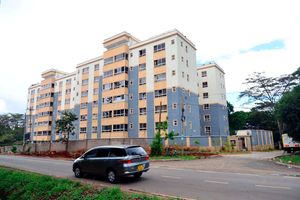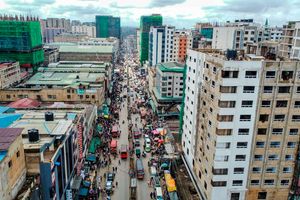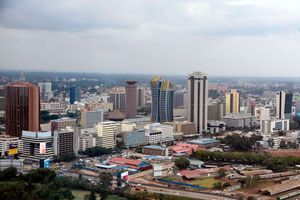
Moses Mwangi Kinyanjui a landlord at Mwihoko during an interview on May 13, 2025.
When Moses Kinyanjui heard of an upcoming city a few kilometres from Mwihoko in Ruiru, the 11,576-acre piece of land that would house Northlands City, associated with the Kenyatta family, he saw an investment opportunity.
In 2017, he bought land in Mwihoko for Sh1.5 million.
“I used to visit some relatives who lived here, and when I heard a city (Northlands) was coming up, I got interested in owning land,” Mr Mwangi tells Lifestyle.
Eight years down the line, bypasses and satellite universities have sprung up. On his 70-by-100-foot piece of land, he has built apartments to house the growing number of people moving to the outskirts of the city. His apartments, he says, which have one-bedroom and two-bedroom rental units, now attract a steady flow of renters.
Located about 16 kilometres away and an eight-minute drive from the Nairobi Central Business District (CBD), Mwihoko is rapidly growing.
“It is now home to people from various communities who have invested in both residential and commercial properties,” says Susan Marbic, who has invested in the area.
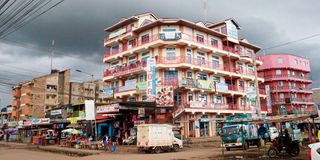
Mwihoko Shopping Centre in Kiambu County pictured on May 13, 2025.
Ms Marbic and her husband built their home at Mwihoko and own a female students’ hostel.
“It is in a serene and quiet environment, just a few kilometres from the country’s largest and busiest city. Facilities such as the Kenyatta University and Kenyatta University Teaching, Referral, and Research Hospital have increased this area’s attractiveness,” Ms Marbic says.
Mwihoko is about five kilometers from the Thika Super Highway and is also near Kiriri Women’s University of Science and Technology and Amref International University, making it ideal for hostel investors.
What began as a friend’s referral in 2012, Ms Marbic says, has led them to buy two plots: one hosting the ladies’ hostel and another where she built her family home.
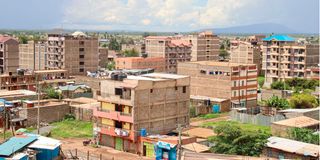
A section of Mwihoko in Kiambu County pictured on May 13, 2025.
“We first bought an eighth of an acre for our homestead and during our stay at Mwihoko 160, we saw the potential for commercial investment,” she says.
Back then, in 2012, they paid Sh500,000 for the eighth-acre plot.
In 2015, the family added an extra plot, on which they constructed Glorious Ladies Hostel, which accommodates students from Kiriri University, Kenyatta University, and Amref, among others, and currently has 140 units.
Its challenges
But just like many areas on the outskirts of the city that are undergoing gentrification, whereby previously poor urban areas are being changed by wealthier people moving in, improving housing, and attracting new businesses, Mwihoko is not controlled. This means anyone is at liberty to build a skyscraper near a bungalow or a shanty near a maisonette.
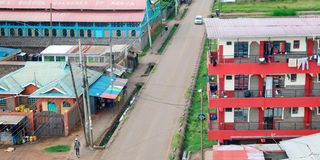
Good road infrastructure in Mwihoko pictured on May 13, 2025.
When we visited Mwihoko, it was bustling; businesses ranging from groceries, mini supermarkets, mama mbogas, hardware stores selling construction materials, restaurants, guest rooms, and other ventures were irregularly and hastily erected.
Lack of sewer lines is also a concern. Mr Kinyanjui laments the laxity by county and national governments in addressing frequent power outages and the lack of proper sewerage.
“For instance, in my estate, we sometimes go for weeks without power. As for sewer lines, there are places where they have not been installed, and when we approach the relevant authorities, we are told to fundraise despite paying land rates,” he says.
In the past, there have also been concerns over rising insecurity, despite having a new police station. The area is surrounded by three police stations, namely; Githurai Police Station, Kahawa Sukari Police Station, and Mwihoko Police Station.
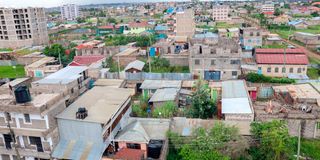
A section of Mwihoko in Kiambu County pictured on May 13, 2025.
Despite the uncontrolled development, Mwihoko does not have industries, an advantage that developers and homeowners say makes it appealing to residents because it means there is no environmental pollution.
“You can live here and work in Nairobi, Kiambu Town, and Thika, among other places on the outskirts of Nairobi,” Ms Marbic says, adding, "the same parcel of land that my husband and I bought for Sh500,000 has now shot up to over Sh5 million, depending on its proximity to the road.
Ancestral land
Northlands City, estimated to accommodate more than 250,000 people, including residents, business owners, and employees, is anticipated to push nearby land costs even higher by the time it is completed.
According to the Northlands City master plan, 3,570 acres have been earmarked for housing, with 3,134 acres designated for low-density housing, 306 acres for high-density housing, and 130 acres for medium-density residential housing.
The development of the city has triggered significant improvements in road infrastructure.
“When I came to this area, there were no tarmac roads. They were all-weather roads, and during the rainy season, they were impassable. Most roads are now tarmacked, and businesses are booming,” says Mr Kinyanjui.
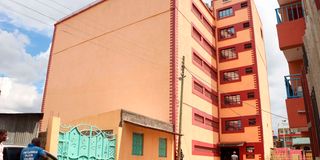
Glorious Ladies Hostel in Mwihoko, Kiambu County, pictured on May 13, 2025.
One of the challenges of investing in new areas is the woes of land ownership and the selling of ancestral land.
“Luckily, Mwihoko is not a predominantly ancestral land. It does not have indigenous people who would claim it belonged to their fathers, grandfathers, or great-grandfathers. We are all new people who have come to invest,” Ms Marbic says.
However, just like land fraud cases facing many urban parts of the country, Mr Kinyanjui advises buyers to ensure they engage government surveyors and conduct thorough background checks before purchasing land.
Some parcels have paperwork that does not correspond to the actual plot size on the ground — a problem that has also been reported in Mwihoko.
→ swaweru@ke. nationmedia.com


